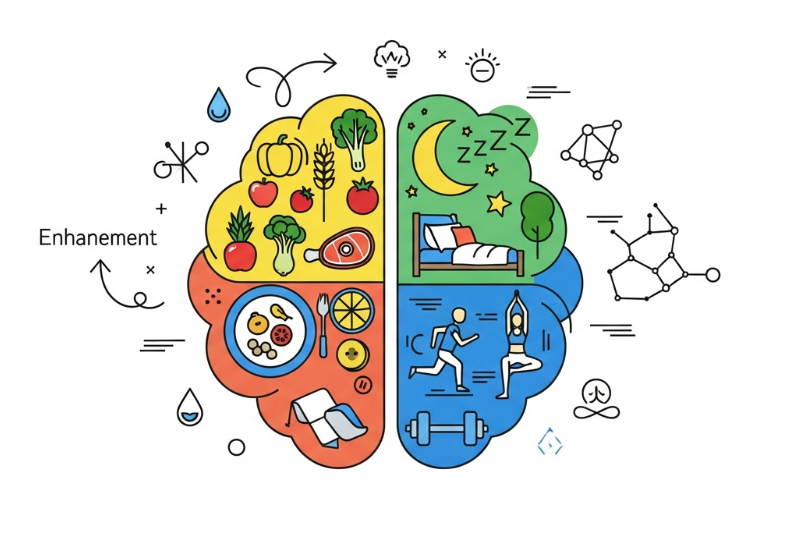Introduction
The human brain — a mere three-pound organ — orchestrates every heartbeat, memory, and spark of creativity that defines our existence. Yet in the modern era, where overstimulation and digital fatigue have become the norm, our mental faculties are often left dull, restless, and overworked.
While supplements and “quick-fix” tonics promise sharper focus, the truth is simpler and more profound: lasting cognitive vitality arises from consistent, natural habits that honor the brain’s biology.
Below are seven thoughtful, evidence-based practices to awaken mental clarity, strengthen memory, and sustain long-term brain health — no shortcuts, no gimmicks, only mindful living.
1. Feed Your Mind with Intelligent Nutrition
What you consume literally becomes the architecture of your mind. The brain thrives on nutrients that stabilize neurons, repair cell membranes, and optimize neurotransmitter function.
- Prioritize omega-3 fatty acids from salmon, walnuts, or chia seeds — essential for cognitive longevity.
- Include antioxidant-rich foods such as blueberries, spinach, and turmeric to neutralize oxidative stress, a silent saboteur of mental agility.
- Choose complex carbohydrates like oats and quinoa to ensure a steady flow of glucose — the brain’s preferred fuel.
A nutrient-dense plate is not indulgence; it’s an investment in neural resilience.
2. Honor Sleep as a Cognitive Ritual
Sleep is not idleness; it’s the brain’s sacred housekeeping hour. During deep sleep, neural pathways are pruned, memories are consolidated, and metabolic waste is cleared.
- Sleep 7–9 hours each night, maintaining consistent rhythms.
- Keep your room dim, quiet, and device-free.
- Avoid caffeine after dusk — your synapses will thank you.
Neuroscientists call sleep “the overnight therapy” for the brain — a natural elixir no pill can mimic.
3. Exercise: The Brain’s Silent Architect
Movement isn’t merely for muscles; it’s nourishment for the mind.
- Regular aerobic activity — walking, swimming, or cycling — increases blood flow to the hippocampus, the seat of memory.
- Strength training stimulates BDNF (Brain-Derived Neurotrophic Factor), often dubbed fertilizer for neurons.
- Yoga and tai chi enhance focus by synchronizing body and breath — a choreography of calm and cognition.
Move not to sculpt the body, but to oxygenate the soul of thought.
4. Cultivate Stillness in a Noisy World
Incessant digital chatter has turned silence into a rare luxury. Yet, the mind grows sharp in stillness.
- Practice mindful meditation for 10–15 minutes daily to quiet mental clutter.
- Spend time in nature; even 20 minutes among trees can recalibrate attention and reduce mental fatigue.
- Limit “information snacking” — constant scrolling erodes deep focus.
A quiet mind is not an empty one — it’s a refined instrument of perception.
5. Challenge Your Brain with Novelty
The mind, much like a muscle, strengthens through resistance. Learning something new encourages neuroplasticity — the brain’s remarkable ability to rewire itself.
- Learn a musical instrument, a new language, or a craft.
- Read books that challenge your worldview instead of confirming it.
- Engage in puzzles or strategy games that require foresight, not repetition.
The unfamiliar is the brain’s favorite playground.
6. Guard Your Mind from Invisible Toxins
Modern environments teem with hidden antagonists that dull cognition — from pollutants to psychological stressors.
- Avoid chronic exposure to air pollution and cigarette smoke, which can impair neural function.
- Maintain mental boundaries: say no to toxic conversations, doom-scrolling, and emotional overload.
- Nourish the body’s detox pathways with leafy greens and proper hydration.
Protecting mental clarity is as much about what you exclude as what you include.
7. Nurture Social and Emotional Intelligence
The brain is profoundly social — it blooms in connection.
- Engage in meaningful conversations that stir empathy and curiosity.
- Express gratitude often; it rewires neural circuits associated with joy and resilience.
- Volunteer or mentor others — altruism fuels serotonin, nature’s built-in antidepressant.
A well-nourished mind is one that feels deeply, not just thinks quickly.
Conclusion
Enhancing brain power isn’t a matter of hacks or haste — it’s an art of balance. When you sleep well, eat mindfully, move with purpose, and cultivate stillness, your mind becomes not just sharper, but wiser.
True intelligence is less about memorizing information and more about sustaining clarity, focus, and compassion in an overstimulated world.
Feed your brain as you would tend a garden — with patience, nourishment, and light.
🇰🇷 Premium Korean Ginseng Online Shop







